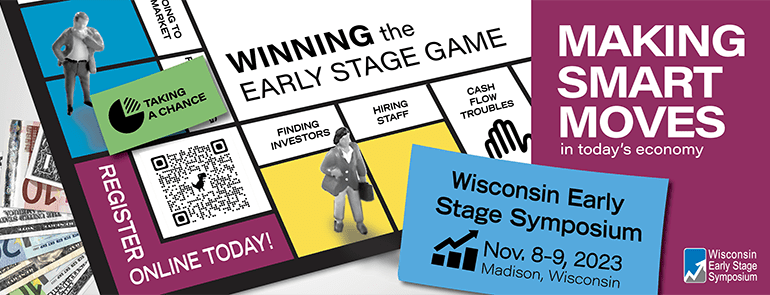
Winnow Fund
At-a-Glance
Type of Firm: Micro VC
Geographic Focus: Wisconsin
Sector Focus: Agriculture, IT, medical devices and imaging, advanced manufacturing, engineered products.
Financing Stage: Pre-seed
Average Investment: $25-100K, $250-500K
Fund Size: $10M
Contact Info: Richelle Martin, Managing Director – https://winnowfund.com/team/
How/why did you get into investing? What is the most exciting/rewarding part for you?
There’s no one path to venture. Mine involved a beer tent and Ken Johnson from the Badger Fund. I found a mentor in him. After talking with Ken and others in the investor community, I thought this is something I want to do. Previously, at UW-Madison, I worked with innovative faculty who came up with creative solutions to a wide variety of problems. I also helped entrepreneurs through the Law & Entrepreneurship Clinic. I get to use all the skills I gained in those positions in my current role. Although my path to get here was meandering, nothing along that path will be wasted in what I do now.
Give us a brief overview of your firm and your investment strategy.
Winnow Fund is a small, what some might term, micro VC fund. We have $10M in assets under management. We focus on pre-seed stage investment in Wisconsin-based companies and have two verticals.
One is more traditional pre-seed. So, a company that is already established, might have a prototype, might have a small team of one to three people, and they are looking for a $250-500K investment. Our other investment thesis is we can find product stage investment opportunities, even earlier than what is typically considered pre-seed. So, in this case it might be an inventor who created something but needs some guidance on turning that into a company. This is a smaller, proof-of-concept or a due diligence kind of investment. Maybe it’s a $25-100K investment that allows that inventor to do a little testing on the product idea, find leadership with our assistance, and legally create that company. Here, our role is to de-risk those first few hurdles an entrepreneur encounters.
At what point should entrepreneurs be when they first contact you?
It depends on whether you are coming to us as an entrepreneur or an inventor. I think of entrepreneurs as more traditional pre-seed. A good time to approach us is when you first need outside capital and are looking to scale. Hopefully, we will replace rounds of investing from family, friends and early angels because that piecemeal fundraising can take up a lot of an entrepreneur’s time and effort. We want to come in and give you one significant investment, so you don’t have to think about fundraising for the next 12-18 months. A lot of people think you need to have some other money in before you go to VC. We don’t feel that way. I think that expectation is a huge issue, especially when trying to increase diversity among entrepreneurs. You don’t only have a good idea if you have a good idea and $100K of your own. If you have a good idea, it’s a good idea. The requirement that you put a lot of your own money in is difficult for a lot of people. I think that’s a reason we don’t see a lot of companies get off the ground. We are willing to be that first significant funding.
For inventors, if you are exploring whether your product is commercially viable, we are happy to talk with you and provide feedback based on our experience. That’s more of a back-and-forth conversation – Getting both sides comfortable with the idea of forming a partnership.
Describe the ideal first interaction scenario you have with an entrepreneur.
I like investor swarms where I can get introduced to eight or ten companies through pitches. I also like warm, double opt-in, email introductions from people and organizations I have relationships with. Entrepreneurs should be brief in their initial email message. Do a little research on the fund in advance, explain how you think your company or idea is a match, and include a short teaser or executive summary.
What can you tell us about determining the value of the businesses you invest in?
It’s really hard to value a company with no customers and a half-developed product at anything more than $1-2M. Our fund typically looks at companies at around $1M in valuation. It’s a much more difficult proposition for our investment committee to approve an investment with a valuation that is more than $1.3M. Valuation is really a discussion. There’s no scientific way to do it in the pre-seed stage. A few things for entrepreneurs to keep in mind – one, it’s a fund manager’s job to negotiate on behalf of their investors, and two, proposing a lower valuation doesn’t mean your company is viewed as an unworthy investment. It could be tied to something the manager needs to do to make it fit the constraints of the fund.
Beside money, what else do you bring to the table for the companies you invest in?
We do expect to take board seats. In doing so, we look for someone who has the skills to add value to the company. Beyond the board, our investment committee is made up of founders, inventors, angels, venture investors and more. These are people who have been on all sides of the table and have seen mistakes. We hope to be mentors that provide guidance and help avoid some of the common pitfalls. For example, I have a legal background. I’m particularly interested in helping people avoid intellectual property issues, confidentiality issues and things people don’t think too much about early on.
In what ways do entrepreneurs often fall short when asking for money?
In the pitch – Sometimes they are pitching the wrong organization. I’ve had people send things where they are asking for more money than is typical for us. So, not doing research is a problem. To me, that sounds like you’ll take money from anyone and you don’t care who. That gives me pause because this is a partnership. People need to make sure they are talking to the right partners, not just casting as wide a net as possible and taking money from anyone who will give it to them. Another pitch related tip is to think through all those things that go into a business plan. Be prepared to answer some specific questions. When do you expect to get your first sales? What happens if a key person leaves? You can’t anticipate every question. It’s OK to say you don’t know and that you will look into it.
What else do you want companies that are seeking funds to know?
People get nervous about approaching investors. We are just regular people. We’re not that different from a lot of entrepreneurs. Also, don’t hide things. We know that no company is perfect. We know that your plan isn’t going to go exactly as you think it will. And please know that if we don’t invest in you, it doesn’t mean we want you to fail. It means we have to look at our portfolio as a whole. If you’re not a good match for us, you might be a good match for someone else.
What is one wish you have for the Wisconsin entrepreneurship ecosystem?
I would love to see more diversity in the investor community. I think the only way we are truly going to get significant change in where our money is going is if we change who is making the decisions. You can’t add diversity into the ecosystem if one of the requirements is that you have done it before. I like that programs such as the Badger Fund are willing to look at emerging fund managers. I think we are going in a good direction. My wish is that it continues and expands.
Bonus Question: Tell us one fun fact about yourself or your firm.
Frequently there are random dogs in my office. I foster dogs and like to sneak them into the office. Sometimes I bring them to meetings. Also, I sometimes teach a fitness class. I find it terrifying. It’s a completely different frame of mind than my work, and that’s why I do it.


